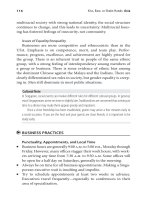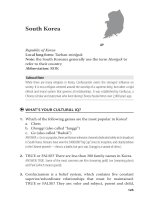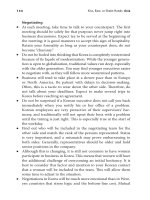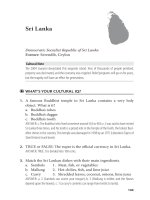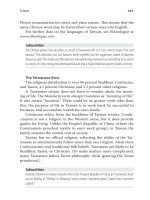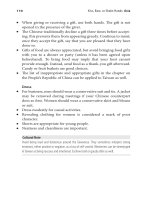How to Do Business in 12 Asian Countries 18
Bạn đang xem bản rút gọn của tài liệu. Xem và tải ngay bản đầy đủ của tài liệu tại đây (104.42 KB, 9 trang )
134
Kiss, Bow, or Shake Hands: Asia
Negotiating
●
At each meeting, take time to talk to your counterpart. e rst
meeting should be solely for that purpose; never jump right into
business discussions. Expect tea to be served at the beginning of
the meeting; it is good manners to accept this sign of hospitality.
Retain your formality as long as your counterpart does; do not
become “chummy.”
●
Do not be fooled into thinking that Korea is completely westernized
because of its façade of modernization. While the younger genera-
tion is open to globalization, traditional values run deep, especially
with the older generation. You may nd younger executives easier
to negotiate with, as they will follow more westernized patterns.
●
Business will tend to take place at a slower pace than in Europe
or North America. Be patient with delays in decision-making.
Oen, this is a tactic to wear down the other side. erefore, do
not talk about your deadlines. Expect to make several trips to
Korea before reaching an agreement.
●
Do not be surprised if a Korean executive does not call you back
immediately when you notify his or her oce of a problem.
Korean employees are very protective of their supervisors’ har-
mony, and traditionally will not upset their boss with a problem
until the timing is just right. is is especially true at the start of
the workday.
●
Find out who will be included in the negotiating team for the
other side and match the rank of the persons represented. Status
is very important, and a mismatch may prove embarrassing to
both sides. Generally, representatives should be older and hold
senior positions in the company.
●
Although this is changing, it is still not common to have women
participate in business in Korea. is means that women will have
the additional challenge of overcoming an initial hesitancy. It is
best to consider this factor and mention to your Korean contact
that a woman will be included in the team. is will allow them
some time to adjust to the situation.
●
Negotiations in Korea will be much more emotional than in West-
ern countries that stress logic and the bottom-line cost. Mutual
trust and compatibility will be the basis of a good business rela-
tionship. Also be prepared for the style to be aggressive at times.
Koreans are much more direct and quicker to express anger or
frustration. Remain calm yourself, and do not take everything
said during these sessions seriously.
●
Consider sending your proposals in advance of your visit for your
host to preview. At a presentation, recap the major points at the
beginning and the end. Break up the information into small seg-
ments with pauses and question-and-answer periods in between.
Be patient with extensive questioning. Address the chief nego-
tiator occasionally, even if he does not speak English. Do not use
triangular shapes in your promotional material, because triangles
have negative connotations.
●
Look for cues that your counterpart did not understand you.
Silence is one such sign.
●
Do not ask or expect Koreans to tell you when this happens, as it
will embarrass them. Instead, rephrase your statement or inquire
if they would like more information.
●
e use of a translator is recommended to avoid these kinds of
miscommunications.
●
Make a beginning bid that will leave you plenty of room to nego-
tiate. Your counterparts will start o with an extreme position but
will be prepared to meet you in the middle. is way both sides
come away having gained a lot of ground.
●
Brute honesty is not appreciated in Korea. While a direct “no” is
more accepted in Korea than in other Asian countries, Koreans
are not as direct as many Westerners. In order to avoid saying
“no,” Koreans will oen give the answer they think the other
wants to hear. It is more important to leave you with good feel-
ings than to be accurate and cause you dismay. erefore, learn
to listen to subtleties by asking questions that do not require a yes
or no answer. A “yes” or nod of the head may mean “maybe” or “I
understand.” A “maybe” usually means “no.” A negative response
is sometimes indicated by a squint of the eyes or by tipping the
head back while drawing air in through the teeth and waiting for
you to speak again.
South Korea
135
136
Kiss, Bow, or Shake Hands: Asia
●
Be sensitive to the overall length of the meeting. If the Koreans
appear curious, take this lead and pursue it. If they return to
social chitchat, take this as a sign that they are nished discussing
business for the day.
●
Bow at the beginning and end of a meeting. An exit bow that is
longer than the greeting bow is an indication that the meeting
went well.
●
Avoid being loud and boisterous around Koreans. Although they
are more direct than most Asians, they dislike rowdy behavior.
●
Treat the elderly with respect. Acknowledge them rst in a group,
and do not smoke or wear sunglasses when they are near. If you
meet in a doorway, allow the older person to pass through rst.
●
Modesty is very important. Do not enter a home or oce until
you are invited, and do not seat yourself until you are asked to
do so. Wait for the invitation to be extended several times before
accepting. Be modest about your position and accomplishments in
your company, and if you receive a compliment, politely refute it.
Expect others to do the same. is should not stop you from com-
plimenting another, however, as compliments are appreciated.
●
Not losing “face”—the dignity of another person—is a very impor-
tant and delicate matter. erefore, never embarrass another
person, especially in public. Never criticize your competition or
admit that you do not know the answer to a question.
●
Do not confuse Korean history and culture with those of any of
its Asian neighbors. Korea has a distinctive language, history, and
culture, and they are very proud of this. is pride and sense of his-
tory is quite strong and constitutes a large part of their self-image.
Koreans are especially sensitive about Japan, so do not bring gis
from Japan or make reference to personal contacts there.
●
If the Korean national anthem is played in a public place, stand at
attention out of respect.
●
Be careful not to overly admire an object belonging to another
person; he or she may feel obliged to give it to you.
●
Contacts are important in Korea. Koreans tend to be suspicious of
people they do not know, or people with whom they do not have
a mutual contact. Try to obtain a personal introduction.
●
Be prepared to give out a lot of business cards. Have your name,
company, and title printed in English on one side and in Korean
on the reverse. Cards are very important, since they indicate your
rank and are a key to the respect you deserve in their culture.
●
Oer your card with your right hand. Never place a Korean’s card
in your wallet if you intend to put your wallet in your back pocket.
Never write on a business card.
●
Do not sign a contract or write a person’s name in red ink. To
many Buddhists, this indicates that the person is deceased.
●
Do not be surprised if you are asked personal questions, such as
how much you paid for something or your salary. ese ques-
tions are not considered in bad taste in Korea and oen reect an
attempt to determine your rank and status.
●
Attempts by foreigners to adhere to Korean modes of etiquette
will not go unnoticed and may be instrumental in your eventual
business success.
Cultural Note
Faux Pas: In 1998, the Swedish automobile firm Volvo bought 85 percent of Samsung’s
construction equipment business. Volvo’s corporate culture is very different from that of the
average Korean firm. In particular, Volvo tried to institute its culture of transparency, sharing
all its plans with its employees in the hope that they will offer useful suggestions. It was
expected that Volvo’s Korean employees would keep the corporation’s plans secret. They did
not. Male Korean executives, like Japanese executives, spend most nights drinking and singing
karaoke with their friends. In Korea, these friends will be a group of people who graduated
from the same college in the same year. Some of them may work for competing companies.
Information that should be proprietorial tends to leak during these drinking sessions. Volvo is
not the only foreign firm to have had problems in this arena.
Business Entertaining
●
e largest meal of the day is eaten in the evening, usually between
6:00 and 8:00 ..
●
Entertaining is most oen done in a restaurant or coee shop;
rarely is it done at home. If you are invited to a home, consider
this an honor. Do not discuss business during a meal unless your
South Korea
137
138
Kiss, Bow, or Shake Hands: Asia
host brings it up rst. Do not expect to be shown around the
house, and do not wander about the home or look in such rooms
as the kitchen.
●
Remove your shoes when entering a Korean home, restaurant, or
temple building. Leave them with the toes pointing away from the
building. When putting your shoes back on, do not sit with your
back toward the temple.
●
Call ahead before visiting a home. When taking your leave,
express your thanks and bow slightly. Send a thank-you note to
your host aer a meal. It is polite to reciprocate by inviting your
host to a meal of equal value at a later date.
●
It is common to be invited out aer business hours to a bar or din-
ner where there will be a lot of alcohol. is is an important part
of establishing an informal relationship and judging character.
e alcohol is a stimulus to expression of more direct opinions;
however, all comments and promises made during these times will
be taken seriously aerward. Do not refuse these invitations, and
do not bring your spouse. Try to reciprocate before you leave.
●
e person who invites the other(s) is expected to pay for the
meal. It is polite for the younger to pay for the older. In all cases, a
good-natured argument over who will pay is expected.
●
Koreans eat a lot of garlic in their food. e smell is emitted from
the skin. In getting used to this, remember that Koreans may nd
the odors emitted from red meat eaters, or heavy caeine drink-
ers, oensive. Remember that the sense of olfaction is in a primi-
tive part of the brain, and any strong reaction you may have to
dierent scents should be guarded. Asian cultures that do not eat
a large amount of dairy products may nd the odor, consistency,
and digestion of cheese dicult to handle.
●
When sitting on the oor for a meal, men should cross their legs
while sitting on the cushion. Women (and men) may sit with their
legs to the side, but never straightened out under the table.
●
Koreans use chopsticks for eating and a porcelain spoon for soup.
Your attempts at using chopsticks will be appreciated. When you
are nished, set your chopsticks on the chopstick rest. Placing
them parallel on top of your bowl is considered a sign of bad luck,



